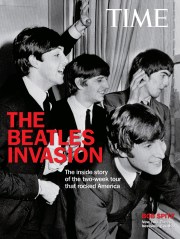The Beatles are shown during their performance on the "Ed Sullivan Show," Feb. 9, 1964, their first appearance on American television.
The reviews of the Beatles’ Ed Sullivan appearance brought everything back down to earth. The boys paged through a stack of them with feigned indifference early the next morning, Feb. 10, over breakfast in their Plaza suite. The table was strewn with dailies that featured their TV debut prominently. They were delighted at first by the extent of coverage, but their faces soon collapsed into furrows and wrinkled brows reflecting the off-key tone of the criticism.
It seemed no one of note had appreciated their act. “Televised Beatlemania,” wrote the New York Times TV critic, “appeared to be a fine mass placebo,” and he dismissed the Beatles as nothing more than a “fad.” The Herald Tribune, while less convoluted, gave it a page-one treatment under the puzzling banner Beatles Bomb on TV. Its columnist blasted the absence of talent in their performance, calling it “a magic act that owed less to Britain than to Barnum.” The Beatles “apparently could not carry a tune across the Atlantic,” he wrote, rating the overall appearance as “75 percent publicity, 20 percent haircut, and 5 percent lilting lament.”
Publicly, the Beatles brushed off such criticism.
“If everybody really liked us, it would be a bore,” John said diplomatically to a reporter later that day. “It doesn’t give any edge to it if everybody just falls flat on their face saying, ‘You’re great.’ ” But privately George fumed, especially over the Barnum comment, calling the crack “fucking soft.”
Perhaps no one took criticism of the Beatles harder than Brian Epstein. To him it was personal, and he was hopping mad, lashing out at the reviews as a “vicious attack.” Throwing a tantrum in his suite, he canceled the remainder of the band’s interviews on the schedule, though he later reconsidered after his frazzled press officer intervened.
Just in time, too, because the boys were facing a daylong marathon of news conferences that drew an impressive crowd of leading journalists. By now, everyone knew what great copy the Beatles made, which brought out the press corps, pens poised and cameras pointed. The reviews may have been crummy, but the ratings prevailed. The Beatles were an out-and-out media sensation.
The official purpose of the first press conference of the day was to announce their three-picture deal with United Artists, which had been consummated in London shortly before they left, but the Beatles played it strictly for laughs. Without waiting to be asked, John announced, smirking, that his choice for a leading lady was Brigitte Bardot.
“How about you, Ringo?” someone called out.
“I don’t mind, meself,” he said, “as long as it’s not Sophia Loren. She’s so tall. I’d have to climb a ladder to kiss her!”
A reenergized Ringo smiled broadly at his audience. He was having the time of his life in New York, where, for some strange reason, his popularity eclipsed that of his more tantalizing bandmates. “When we got to America,” he observed, “it wasn’t John, Paul, George and Ringo.
Half the time it was Ringo, Paul, George and John … Suddenly it was equal.”

Despite the snarky criticism, the Beatles relished fencing with the press, trading the kind of sharp-edged wisecracks and one-liners that seemed polished by comedy writers. They kept up the relentless pace throughout the afternoon conferences, giving as good as they got, never once buckling under the strain. The result was a public-relations sensation. The Beatles’ drollery defanged the hard-core press; their gung-ho spirit, their willingness to play ball gave them immunity.
This is the fourth installment in a series of excerpts from the new TIME book, The Beatles Invasion: The Inside Story of the Two-Week Tour That Rocked America, by Bob Spitz. Copyright 2013, Time Home Entertainment. Available wherever books are sold.
First installment: The Beatles Invasion, 50 Years Ago: Friday, Feb. 7, 1964.
Second installment: The Beatles Invasion, 50 Years Ago: Saturday, February 8, 1964
Third installment: The Beatles Invasion, 50 Years Ago: Sunday, Feb. 9, 1964

